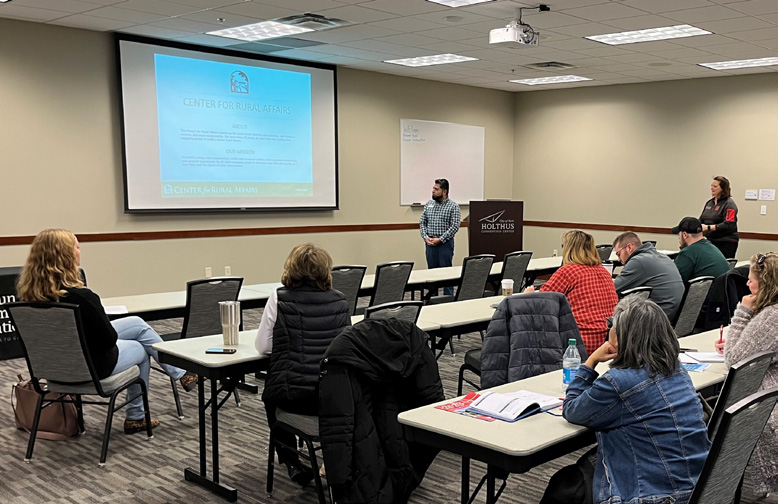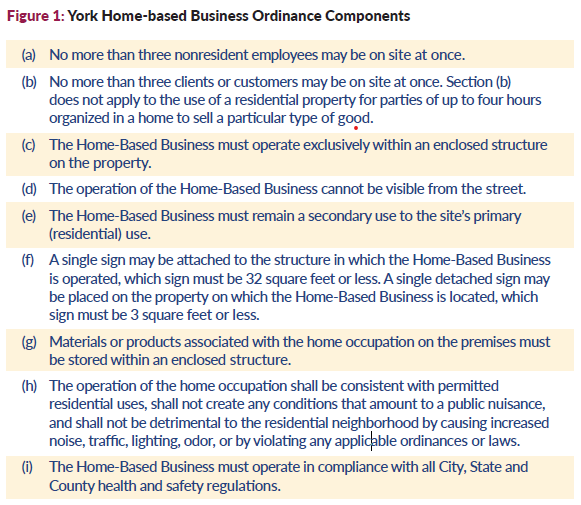
Updating local zoning to encourage microenterprise
April 17, 2023
Article Published in PUBLIC MANAGEMENT | A P R I L 2 0 2 3. Written by Dr. Sue Crawford, PH.D.
Technology advances and COVID-19 pandemic work-from-home experiences now encourage an unprecedented number of people to work from home and to start new home enterprises. Home-based businesses as microenterprises, start-ups, and side hustles make up an important part of economic development in our communities. However, zoning regulations in communities often fail to match this new era of home-based businesses. The eye opener for the city of York, Nebraska, came when we discovered that many of the kinds of micro-businesses that we want to encourage in our community were technically illegal. According to a recent study of home-based business regulations by The Center for Growth and Opportunity at Utah State University, York was far from alone in needing to update our home occupation zoning rules.
It’s difficult to assess the current scope of home-based businesses. A study in 2018 found that home-based businesses represented nearly one in six businesses in 2014.2 Post-COVID, communities have seen dramatic increases in new business starts and in the number of people working from home in all types of businesses. Recent advances in cottage food laws and in technology open up even more opportunities for home-based businesses. According to the U.S. Census, annual applications for business starts increased by almost 20 percent from 2021 to 2022 in Nebraska alone.3 Home-based businesses likely represent many of these new business starts across the nation.
The inadequacies of York residential zoning for home enterprise came to light in 2022 when our county economic development director (Lisa Hurley, York County Economic Development Corporation) sat down with a York resident to set up a business plan for a small wood-working business. th at he planned to start in his garage. As a law-abiding, responsible entrepreneur, he asked her about the legal requirements for such a business in the city. A quick check of city zoning rules revealed that the business of interest was clearly not allowed by York’s current zoning rules.
at he planned to start in his garage. As a law-abiding, responsible entrepreneur, he asked her about the legal requirements for such a business in the city. A quick check of city zoning rules revealed that the business of interest was clearly not allowed by York’s current zoning rules.
York did not have code enforcement officers roaming the streets checking for out-of-compliance home enterprises. However, the fact that home-based businesses were not legally allowed by existing zoning codes still posed barriers. The economic developer could not ethically say, “Don’t worry about it, they don’t enforce it anyway.” A neighbor or competitor could challenge a non-conforming business under the old codes and the city would be pressed to enforce the out-of-date rules. A lender might ask for evidence from an aspiring entrepreneur that their business plan meets city zoning rules. To his credit, the entrepreneur did not want to start a business that violated city rules, so the out-of-date rules clearly posed an immediate barrier to him.
Shortly after her conversation with the woodworker entrepreneur, the economic developer emailed me a copy of our city’s zoning restrictions on businesses in residential areas and recommended that we work together to update them. The definitions of occupations allowed in residential areas were clearly out of step with current business and microenterprise realities. We set out to change the zoning rules to make sure that York was supportive of home-based businesses in a way that was consistent with other
The zoning updates in York needed to reduce barriers while still protecting quality of life expectations for residentially zoned areas.
